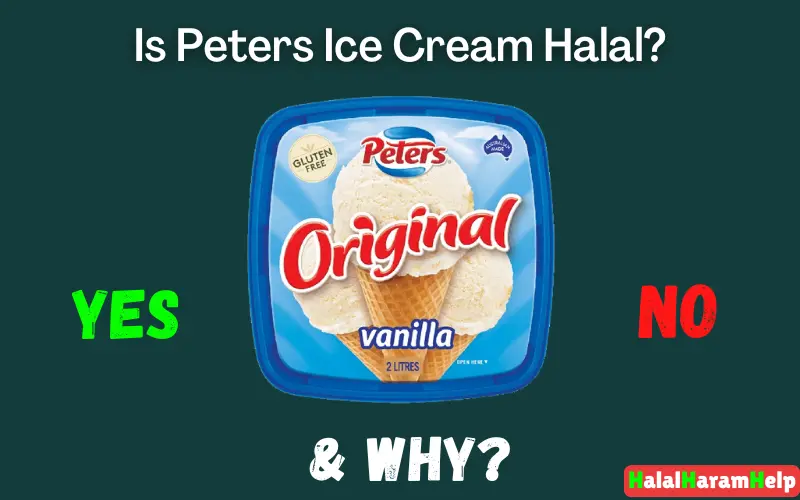Peters Ice Cream is a beloved brand known for its wide range of flavors and creamy textures.
However, for Muslim consumers who follow halal dietary guidelines, the question of whether Peters Ice Cream is halal is important.
Despite its popularity, Peters Ice Cream does not hold a halal certification, leading to uncertainty about the permissibility of its products.
Hence, in this article, we’ll explore the ingredients, potential cross-contamination risks, and lack of halal assurance statements from Peters Ice Cream to help you decide whether it aligns with your dietary requirements.
Let’s get started.

Is Peters Ice Cream Halal?
No, Peters Ice Cream is not halal certified. At the same time, this doesn’t automatically mean that all Peters Ice Cream products are haram (forbidden).
However, the lack of halal certification raises concerns for Muslim consumers who adhere to strict dietary guidelines.
Let’s explore the reasons why Peters Ice Cream is not considered halal and why caution is advised for those seeking halal-compliant options.
You might also like to know is Vanilla Ice Cream halal.
Why Is Peters Ice Cream Not Halal Certified?
Peters Ice Cream, despite being a well-known and popular brand, has not pursued halal certification from recognized Islamic organizations.
This absence of certification means there’s no formal assurance that the ingredients and manufacturing processes align with Islamic dietary laws. Here are the key factors contributing to its non-halal status:
1. Lack of Halal Certification:
Peters Ice Cream has made no efforts to obtain a halal certification, which is essential for verifying that the entire production process, from sourcing ingredients to final packaging, complies with halal standards.
Without this certification, there’s no guarantee that the products are free from non-halal ingredients or contaminants.
2. Use of Non-Halal Ingredients:
One of the primary concerns with Peters Ice Cream is the potential inclusion of non-halal ingredients such as gelatin, which is commonly used as a stabilizer in ice cream.
Gelatin can be derived from pork or non-halal animal sources, making it impermissible in halal diets.
Additionally, certain flavors and additives used in ice creams may contain haram drinks or other non-halal elements that are not disclosed publicly, adding to the uncertainty.
3. Cross-Contamination Risks:
Even if some of the ingredients used in Peters Ice Cream are halal, the risk of cross-contamination during production remains a significant issue.
Ice creams are often manufactured in facilities that also handle non-halal products. Shared equipment and insufficient cleaning protocols between production runs can lead to traces of non-halal substances being present in otherwise halal ingredients.
This risk of contamination is especially concerning for consumers who strictly follow halal guidelines.
4. No Assurance of Halal Practices:
Peters Ice Cream has not made any public statements or commitments to halal practices. This lack of transparency can be problematic for Muslim consumers who rely on clear and direct communication from brands to make informed dietary choices.
You can also see is Carte D’or Ice Cream halal.
Ingredients Used In Peters Ice Cream
Peters Ice Cream typically uses a blend of ingredients such as milk, cream, sugar, cocoa, and various flavorings like strawberry and chocolate.
While these basic components might seem harmless, the source and processing of these ingredients are crucial in determining their halal status. For example:
Gelatin: Commonly used in ice cream, gelatin often comes from animal sources, including pork or non-halal beef, which are not permissible in a halal diet.
Flavors and Additives: Some flavorings can contain trace amounts of haram drink or other non-halal substances that make them unsuitable for halal consumption.
It’s not just about the ingredients listed on the label but also about how they are sourced and processed. Without halal certification, there is no reliable way to verify these factors.
Guidance For Muslim Consumers
Given the above factors, it is advisable for Muslim consumers to avoid Peters Ice Cream unless the company pursues and obtains proper halal certification.
Without this certification, there is no way to ensure that the ice cream is free from non-halal ingredients or contamination.
For those following a halal diet, always look for clear halal markings on products or refer to certified halal brands that openly communicate their compliance with Islamic dietary laws.
Contacting companies directly to inquire about their halal status can also provide additional clarity, although it is not a substitute for formal certification.
Also see is Ferrero Rocher Ice Cream halal.
Conclusion
Peters Ice Cream is not halal certified, and its use of non-halal ingredients like gelatin, along with the risk of cross-contamination, makes it unsuitable for those following a halal diet.
The lack of halal assurance and transparency further raises concerns.
Until Peters Ice Cream obtains proper halal certification, Muslim consumers should choose brands that clearly meet halal standards.
Always check for halal labels or certifications to ensure the products you consume align with your dietary requirements.


